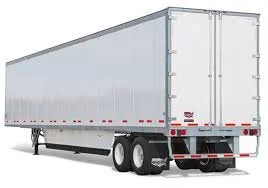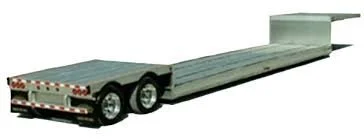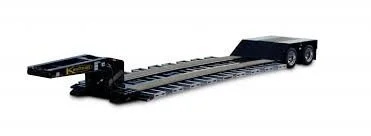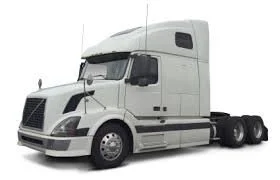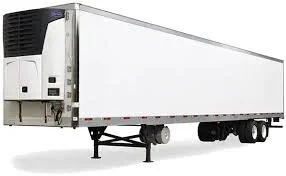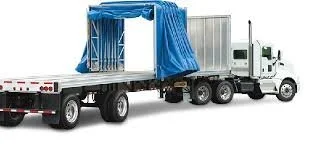All Full Truckload Trailer Types in One Place 😱
Have you ever found yourself falling helplessly down the rabbithole of tractor trailer types? Me too! Lucky for you that happened to me recently and I decided to make good use of it. There are so many different trailers, it would be nice to see them side by side in one place. This post aims to help you figure out what you need and a rough cost so you can avoid delays, excess fees or overpaying for the wrong type of equipment.
The 11 most common types of equipment used in the full truckload industry:
Dry Van:
The gold standard covered wagon for wares. Dry vans are 53’ (occasionally 48’) of dry boxy space, capable of loading up 26 skids (or more if you turn them sideways).
The industry’s workhorse.
Best suited for: Dock to dock, goods that need to be protected from the elements and/or locked up.
Example: iphones.
Cost: Market
Availability: High
Flat bed:
A 53’ bed-only version of the dry van. Most carriers have tarps to cover goods in case of weather.
Spreadable Flatbed shown here
Best suited for: Loading from the side or with a crane
Example: Catch basins
Cost: Market
Availability: High
Step Deck:
This is a flatbed with two decks. An upper deck and a lower, shorter deck. If you go upper deck, be careful loading and keep it street legal.
Best suited for: 20’ or 40’ standard sized containers
Cost: About the same as a flatbed
Availability: High
Lowboy:
aka double drop: This beaut 😍 has 3 total decks, including a low deck to accommodate oversized equipment or goods.
Best Suited for: 40’ High Cube containers, loading with a crane, loading from the side.
Cost: High
Availability: Low
RGN – (Removable Gooseneck):
As its clever name suggests 🦢, this transforming goose shaped unit detaches at the front leaving it’s low bed inches from the ground. This is perfect for driving large equipment right onto the main deck.
Best Suited for: Construction equipment
Cost: High
Availability: Low
PO (Power Only):
aka Bobtail: A tractor or “power” unit without any trailer.
Best Suited for: Pulling a trailer owned by someone else.
Cost: Market
Availability: Low
Flatbed Stretch:
A flatbed trailer with adjustable length.
90’ flatbed stretch trailer
Best Suited for: Exceptionally long freight such as building material..
Example: Steel support beams
Cost: High
Availability: Low
Refrigerated:
aka Reefer: An insullated trailer with temperature controlled equipment mounted to the front. Different units have different temperature ranges. These units can also be reversed to become heated trailers during winter months.
Best Suited for: Food, pharmaceuticals, sensitive equipment
Cost: Medium
Availability: Medium
Conestoga:
Flatbed trailers with a rolling tarp-on-frame system. If a dry van and a flat bed had a baby…it would be a conestoga. It is the best of both worlds because it allows loading from the sides or top but also provides protection from the elements.
Best Suited for: Large or heavy goods also sensitive to the elements
Example: Rolled alloys, helicopters
Cost: High
Availability: Low
Heavy Haul:
aka Over weight - multi axle - These units pack additional axles to spread the weight of heavy loads more evenly over the roads.
Best Suited for: Massive, heavy items that cannot be broken down or disassembled before transport
Example: Power plant parts, ships, defense
Cost: Very high
Availability: Very low
There are many different types of trailers. Whatever you are working on we can help you find the right unit to get you from A to B. If you’re tired of doing the leg work or just want to outsource your time consuming truckloads, let’s work together! We can help you figure out which trailer you need for your job or project and source that equipment for you. Click the button to contact us and learn more about our Truckload services.
PS: Along my deep dive, as you might expect, I stumbled across some trailer types and gadgets that didn’t relate to this post. But, just to show you how weird and cool the future will be, here’s a quick run-down of the robotic “trailer valet”.
Trailer Valet:
Remote controlled robotic trailer mover. This little machine moves on tracks like a tank and only weighs 99 lbs. It doesn’t appear to be able to move anything larger than a boat or RV at this point but I would imagine they’re working on that.
The future is weird.
Best suited for: Moving trailers around without a power unit or in small, tight spaces. This would be perfect for cities like NYC where space is at a premium.
Cost: $3500.00
Availability: Home Depot?

